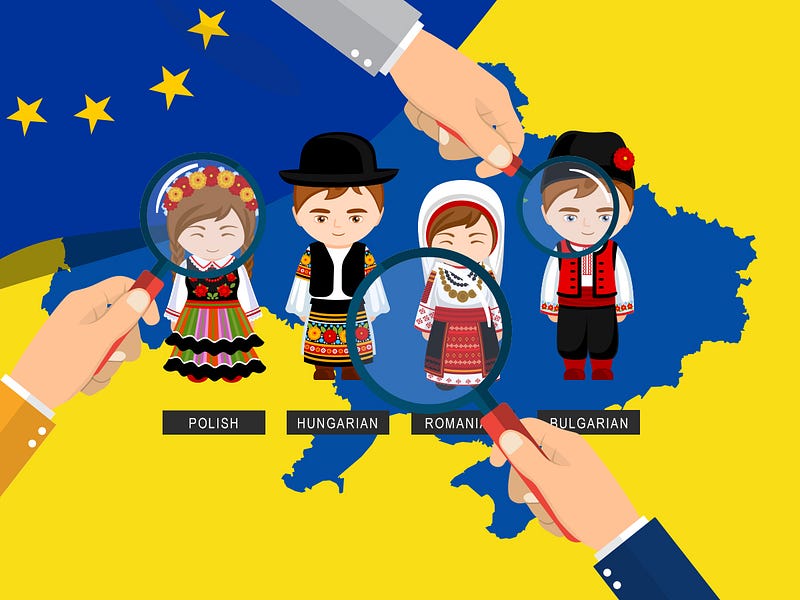
The reform of legislation on ethnic minorities was identified as one of the major requirements Ukraine has to meet to maintain its recently received EU candidate status. According to various studies, this condition was put on the list specifically to appease Hungary, so that Budapest which is dissatisfied with Ukraine’s policy towards ethnic minorities would not block the procedure of granting EU candidate status to Ukraine, in order to push through a decision as soon as possible, so that Brussels could refer to it as an unanimous European standpoint. (Let me recall that this very unity was also in the spotlight during the adoption of the latest sanctions packages, to such an extent, that the EU, for the sake of this aim, was willing to introduce exemptions.)
The obligation to respect the rights of the national minorities is indeed commendable, but it is just awesome that when it comes to minority issues, the EU expresses concern about an ethnic minority group of approx. 130,000 (this pre-war data indicates the number of ethnic Hungarians in Ukraine), and Brussels does not even waste its time with consolidation of the conditions of those several millions of ethnic Russians living in Ukraine. I do understand that in the light of the war this issue may turn out to be an insoluble problem, but if the EU does not even require of Kyiv to grant the Russian community their rights, it clearly signals the onset of a dark age in Ukraine. If fundamental ethnic rights are not guaranteed even to the largest ethnic community in Ukraine, then what prospects the smaller ethnic groups could have? On behalf of a national minority, I ask the question: what rights and protection can Poles, Hungarians, Romanians, Bulgarians etc. hope in the new realities of post-war Ukraine?
In addition to several Russian TV channels, Russian music in general has recently been put on ban list in Ukraine. Do you understand what is going on there? To be honest, I am at a lost to understand this decision. Is this consistent with the candidate’s status and compatible with the fundamental principles of the EU…? I can see no difference between beating off the head of the statue of Ukraine’s iconic poet Taras Shevchenko in the framework of Russia’s so-called ’special operation’ in Ukraine, damaging Polish memorials and pouring red paint on the statue of Hungary’s national poet Petofi. (Such incidents were quite frequent before the war, in the regions of Ukraine populated by Polish and Hungarian ethnic groups, in Lviv and Zakarpattya Oblasts.) Each acts described above are extremely radical, and aimed to destruct the very substance of these nations, namely their cultural identity and cultural foundations.
I am convinced that, in the long run, Ukraine’s EU candidacy will not bring a substantial change in the Ukrainian position as for the ethnic rights, and also in the field of possible actions in domestic and foreign policy in general, including the process of universal democratization. Take, for example, Turkiye! On the one hand, we can see that Turkiye has received a candidate status back in 1999… On the other hand, did this fact contribute to any changes in the architecture of the state or did the anti-democratic tools used by the authorities change for the better? I hardly believe.
Similarly, it seems to me, that Ukraine also has no real chance for democratization, which could provide the appropriate conditions for cementing the rights of national minorities. I would consider it an encouraging progress if Ukraine, within the framework of structural reforms would be ready for modification of the system of the so-called indigenous ethnic communities, but I cannot see the slightest chance of such a development. (For purely political reasons, the Crimean Tartars and Poles are considered indigenous in Ukraine, while Russians and Hungarians, also out of political consideration, are not.)
When Kyiv understands that, besides native Ukrainians, Ukraine is made up of considerable and valuable national minorities, and it would be ready to express its commitment to the harmonization of the related laws with the European rules and standards, extensive structural reforms will be necessary, starting with amendments to existing laws, including the Laws on Education, on Languages, on Citizenship and so on.
But right now it should be kept in mind that, Ukraine is in a state of war, so the necessity of a long-range settlement of ethnic rights, in all likelihood, will not be the most important thing to be done. In fact, just the opposite, Kyiv looks at the issue of infringement of the rights of national minorities as a political tool, as long as it guarantees at least a one-day success, as it is clearly represented by the crazy and tremendously short-sighted step of banning Russian music in Ukraine.
When the European Union realizes that Kyiv, under the pretext of solving the issue of the national minorities, including their protection, is taking such steps, Brussels should send an immediate warning to Ukraine that such actions will not lead anywhere, and without real reforms, Kyiv may be deprived of EU candidacy.
Leave a Reply